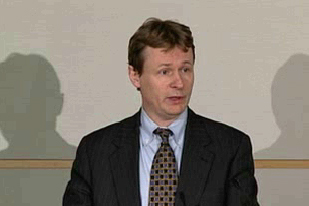Can You Trust Your Instincts?
Wesley J. Wildman, a School of Theology associate professor of theology and ethics, discusses the cognitive reliability of spiritual experiences

Click here to watch Wesley J. Wildman on BUniverse.
Wesley J. Wildman, a School of Theologyassociate professor of theology and ethics, discusses the cognitivereliability of spiritual experiences in Can You Trust Your Instincts?,the fourth lecture in a six-part series titled Religious Experiences:From the Mundane to the Anomalous. He builds upon his previousdiscussions of religious and spiritual experiences to propose a newphilosophical framework for questioning the truthfulness of themeaningful moments that shape our religious beliefs.
Wildmanbegins by examining the reliability problem that has long troubledtheologians, psychologists, and philosophers of religion. If thebeliefs we hold are true, he says, we can assume the thoughts thatproduced our beliefs are reliable. When dealing with spiritual andreligious experiences, however, determining the truthfulness of ourbeliefs is impossible. Therefore, Wildman argues, the question ofwhether or not these experiences are reliable can never be answered,and needs to be approached from a new angle.
After outliningseveral common but inadequate criteria for reliability, Wildmanproposes a new way of looking at the problem. Rather than asking ifexperiences are reliable, he poses the question, To what degree can wetreat our own experiences are reliable? He gives three conditions forlooking at intense spiritual experiences: the analysis of an experiencemust take into account natural cosmology, the role the person’senvironment plays in the experience, and the symbolic nature ofreligious cognition. Wildman concludes that the reliability problem canonly be partially solved, noting, “the subject matter defeats us to asignificant degree.”
Part of a research project at the Danielsen Institute’s Center for the Study of Religion and Psychology,the lecture series is funded by a Templeton Foundation grant from theMetanexus Institute, which administers the Templeton Research Lectures.
February 25, 2007, 7:30 p.m.
Photonics Center
About the Speaker:
Wesley J. Wildmanis an associate professor of theology and ethics at the BostonUniversity School of Theology, where he directs the doctoral programsin Christian theology, in comparative theology, and in science,philosophy, and religion. Wildman has a bachelor’s in mathematics fromFlinders University and a graduate degree in divinity from theUniversity of Sydney, both in Australia. He earned a doctorate inphilosophical and systematic theology and philosophy of religion fromthe Graduate Theological Union, in Berkeley, California. He haspublished more than 60 articles and the book Fidelity with Plausibility: Modest Christologies in the Twentieth Century. Wildman is the coeditor of the Encyclopedia of Science and Religion,as well as a collection of debates on contemporary issues in religionand science. He has studied the nature and problems of religiousexperience for over a decade through his involvement with the Divine Action Project at Boston University, sponsored by the Vatican Observatory and the Center for Theology and Natural Sciences, in Berkeley, and the Crosscultural Comparative Religious Ideas Project at BU.An ordained minister in the Uniting Church in Australia, Wildman hasserved churches in Sydney, Australia, and Piedmont, California.
Comments & Discussion
Boston University moderates comments to facilitate an informed, substantive, civil conversation. Abusive, profane, self-promotional, misleading, incoherent or off-topic comments will be rejected. Moderators are staffed during regular business hours (EST) and can only accept comments written in English. Statistics or facts must include a citation or a link to the citation.